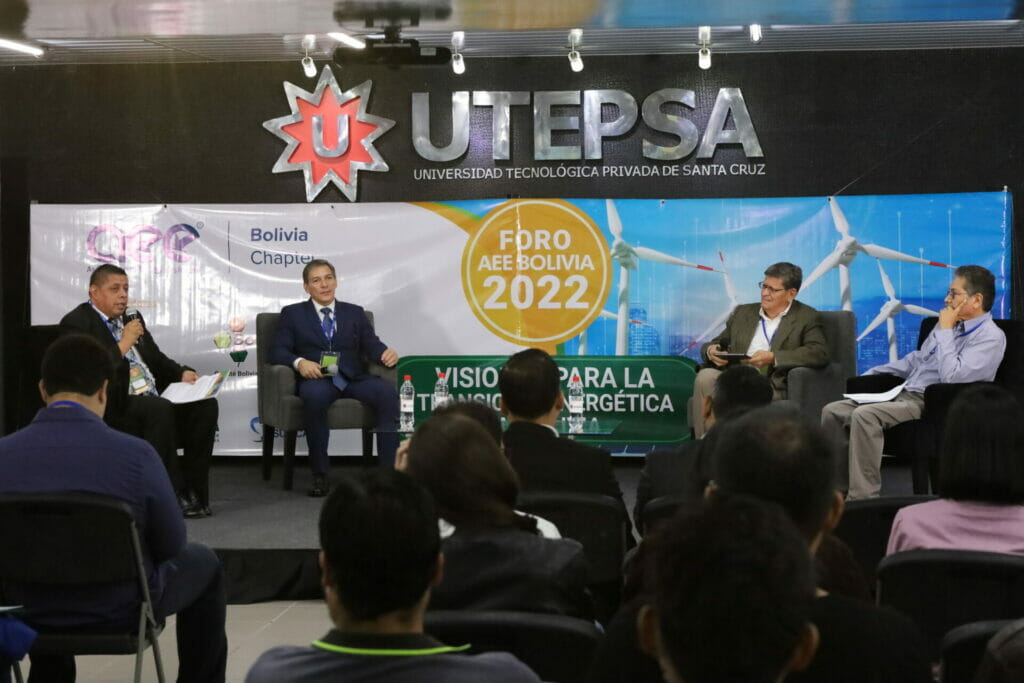In The News
Conclusions from the AEE Bolivia Forum 2022
The AEE Bolivia 2022 Forum, which took place on October 14 in the city of Santa Cruz (UTEPSA University), concluded with great success after learning about the experiences and propositional contributions of those who were the panelists of the event.

The event had the active participation of the national electricity sector, industrial, energy, and academic sectors, who gathered to learn first-hand what the vision is that each expert has concerning the energy transition that Bolivia must face. The presentation by Dr. Ramon Méndez, former Uruguayan National Secretary of Energy, clearly showed the challenges, opportunities, and lessons learned that the country went through to achieve a decarbonization of its economy that is recognized in the region as a benchmark. The three panels raised in the forum tried to cover most of the links in the country’s energy value chain. Thus, panel one on the increase in the production of liquid hydrocarbons and biofuel solutions, through the invited panelists, showed some opportunities and solutions that can be faced to reactivate the sector oriented towards its contribution to the energy transition. Panel two, on energy efficiency and distributed generation, showed the country’s benefits of effectively applying these elements. Finally, panel three reinforced the value chain with emerging technologies such as electromobility and hydrogen.
The forum reached fascinating conclusions that add value to the energy transition strategy in Bolivia. These conclusions can be summarized in the following points:
- It is possible to move from an essentially fossil electric energy matrix to a hybrid with a predominance of renewables based on wind and photovoltaics. The success factors in Uruguay have shown that this is possible under a great consensus and national pact among all the technical, social, and political actors to establish state policies in relation to this issue.
- Electrifying the Bolivian energy matrix implies reconfiguring it through mapping all its primary, secondary, and tertiary components; and carrying out careful planning, in which the main objective is the migration of services towards electrification (case of transport, industry, residential, and commercial). The renewable energy infrastructure that is developed must be designed to support this electrification so that it does not harm the national electrical system or the operation of the load dispatch.
- A key element, perhaps the most neglected, is energy education which must be present at all educational levels and in society as a whole, through dissemination programs and training, with clear guidelines on energy efficiency, rational use of energy, and climate change. These programs, which must be based on energy policies in the education dimension, should be taught in schools, institutes, universities, public institutions, companies, professional associations, and other organized social groups.
- It has been proposed to import oil via pipeline from Argentina to process it in Bolivia’s refining infrastructure and to be less dependent on diesel imports.
- Develop comprehensive energy planning in the Bolivian State’s corresponding instances; it also contemplates all the key actors in the national energy transition, that it be established as a long-term State policy towards the year 2050 at least.
- As part of comprehensive energy planning, policies for the penetration of electromobility must be deepened, with specific access programs for the population and transport sectors.
- Accelerate the energy transition towards compliance with the commitments assumed internationally, such as the Paris Agreement in 2016, and that it goes to the benefit of our country and ecosystem.
The AEE Bolivia 2022 Forum has generated spaces for analysis and proactive proposals as a contribution to our country’s energy development by experienced professionals in the different axes of energy development. They can be forwarded to the corresponding levels to help with the national energy transition strategy. Our main objective is to contribute professionally to our beloved Bolivia.